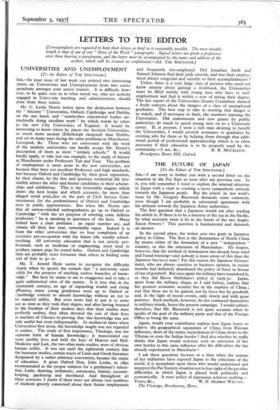LETTERS TO THE EDITOR
[Correspondents are requested to keep their letters as brief as is reasonably possible. The most suitable length is that of one of our " News of the Week " paragraphs. Signed letters are given a preference over those bearing a pseudonym, and the latter must be accompanied by the name and address of the author, which will be treated as confidential.—Ed. THE SPECTATOR.]
UNIVERSITIES AND UNEMPLOYMENT
[To the Editor of THE SPECTATOR.]
Sta,—In your. issue of last week you printed two interesting Letters on Universities and Unemployment from two corre- spondents amongst your senior readers. It is difficult, how-. ever, to be quite sure as to what moral we, who are actively engaged in University teaching and administration, should draw from these letters.
Mr. C. Leslie Norris insists upon the distinction between the " Ancient " Universities, Oxford, Cambridge and Dublin, on the one- hand, and " numberless educational bodies un- doubtedly doing excellent work " by - which words he refers to the new City Universities of England. It would be interesting to know where he places the Scottish Universities, so much more ancient (Edinburgh excepted) than Dublin, and yet in many ways facing the same problems as Manchester, Liverpool, &c. Those who are conversant with the work of the modern universities can hardly accept Mr. Norris's description of them as mere " tertiary schools." It would hardly apply, to take but one example, to the study of history at Manchester under Professors Tait and Tout. The problem of employment is more acute in the new universities, not because they have not excellent Professors and high standards, but because Oxford and Cambridge by their great reputation, by their charm, by the free and spacious residential life irre-, sistibly attract the abler and keener candidates to their scholar- ships and exhibitions. This is the irresistible magnet which draws the ,best, brains and which accounts, far more than alleged social prejudice on the part of Civil Service Com- missioners, for thv predominance of Oxford and Cambridge men in public appointments. But when Mr. Norris says that all serious-minded undergraduates go up to Oxford or Cambridge " with the set purpose of entering some definite profession " he is speaking in ignorance of the facts. Many indeed have a clear ambition : . an equal number are, and remain till their last -year, remarkably vague. Indeed it is from the other universities that we hear complaints of an excessive pre-occupation with the future job, usually school- teaching. All university education that is not strictly pro- fessional, such as medicine or engineering, must tend to produce square pegs for round holes. Oxford and Cambridge Men are probably more fortunate than others in finding some sort of hole to go to.
Mr. T. Arnold Hyde seems to recognise the difficulty dearly when he quotes the remark that " a university exists solely for the purpose of teaching useless branches of know- ledge." But here he seems to me to exaggerate and to take a quite unhistorical view of the matter. It is true that in the oineteenth century, an age of expanding wealth and rising affluence, many young gentlemen went up to Oxford or Cambridge content to absorb knowledge without an eye to its material utility. But even more had to put it to some use as soon as they took their degree, and after having boasted in the freedom of their student days that their studies were perfectly useless, they often devoted the rest of their lives as teachers of Classics to proving that this knowledge was not only useful but even indispensable. In mediaeval times when Universities first arose, the knowledge taught was not regarded as useless. The study of first importance, Theology, was the supreme form of human knowledge ; it transcended our mere earthly lives and held the keys of Heaven and Hell. Medicine and Law, the two other main studies, were of obvious
human utility. It was not until the eighteenth century that the humaner studies, certain tracts of Latin and Greek literature designated by a rather arbitrary convention, became the staple of education. A great Oxford Don, John Locke, in 1690 recommended as the proper subjects for a gentleman's educa- tion, Latin, drawing, arithmetic, astronomy, history, account- keeping, gardening and shorthand. And throughout all these centuries I doubt if there were not always vast numbers of students gravely concerned about their future employment
and frequently mis-employed. Did Jonathan Swift and Samuel Johnson find their path smooth, and was their employ= ment always 'congenial and suitable to 'their acconiplishments ?
Unless there is a very large claSs of persOns Who need not know anxiety aboui gaining- a livelihood, the Universities must be filled mainly with young men who have to seek employment 'and find it within a year of taking their degree. The last report of the Universities Grants` Conimittee shoWed. a lively concern about the dangers of a class of unemployed graduates. The best step to take in meeting that danger is to watch, and if necessary to limit, the numbers entering the Universities. Old endowments and new grants by public authorities do much to speed' young men on to a UniversitY career. If, at present, I were a rich man desiring to benefit the Universities, I would provide assistance to graduates by creating jobs for them' or by' helping them through that addi- tional period of professional apprenticeship which is so often necessary if their education is to be properly used by the










































 Previous page
Previous page